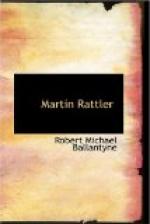“Bob Croaker,” said Martin, holding out his hand, “I’m sorry we’ve had to fight. I wouldn’t have done it, but to save my kitten. You compelled me to do it, you know that. Come, let’s be friends again.”
Bob made no reply, but slowly and with some difficulty put on his vest and jacket.
“I’m sure,” continued Martin, “there’s no reason in bearing me ill-will. I’ve done nothing unfair, and I’m very sorry we’ve had to fight. Won’t you shake hands?”
Bob was silent.
“Come, come, Bob!” cried several of the bigger boys, “don’t be sulky, man; shake hands and be friends. Martin has licked you this time, and you’ll lick him next time, no doubt, and that’s all about it.”
“Arrah, then, ye’re out there, intirely. Bob Croaker’ll niver lick Martin Rattler though he wos to live to the age of the great M’Thuselah!’” said a deep-toned voice close to the spot where the fight had taken place.
All eyes were instantly turned in the direction whence it proceeded, and the boys now became aware, for the first time, that the combat had been witnessed by a sailor, who, with a smile of approval beaming on his good-humoured countenance, sat under the shade of a neighbouring tree smoking a pipe of that excessive shortness and blackness that seems to be peculiarly beloved by Irishmen in the humbler ranks of life. The man was very tall and broad-shouldered, and carried himself with a free-and-easy swagger, as he rose and approached the group of boys.
“He’ll niver bate ye, Martin, avic, as long as there’s two timbers of ye houldin’ togither.”
The seaman patted Martin on the head as he spoke; and, turning to Bob Croaker, continued: “Ye ought to be proud, ye spalpeen, o’ bein’ wopped by sich a young hero as this. Come here and shake hands with him: d’ye hear? Troth an’ it’s besmearin’ ye with too much honour that same. There, that’ll do. Don’t say ye’re sorry now, for it’s lies ye’d be tellin’ if ye did. Come along, Martin, an’ I’ll convarse with ye as ye go home. Ye’ll be a man yet, as sure as my name is Barney O’Flannagan.”




